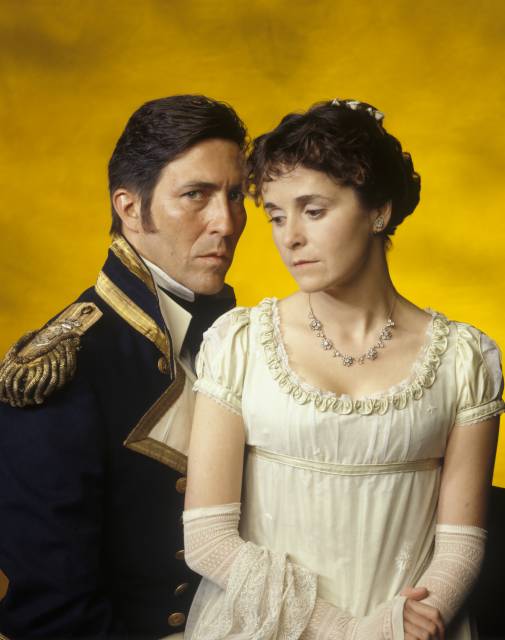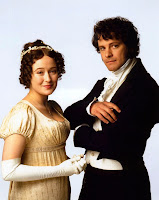Austen’s novel illuminates this proverbial saying: “If something is truly meant and intended for you, it will come your way another time.” Anne Elliot and Captain Wentworth were in love and engaged, but her aristocratic father, Sir Walter Elliot, and a respected family friend, Lady Russell, disapproved the match and persuaded Anne to terminate the engagement. As a naval officer, “a stranger without alliance or fortune,” Wentworth “had no hopes of attaining affluence … and no connexions to secure even his farther rise in that profession.” Seven years have passed, and Anne is now 26. During the interim she and Wentworth have not corresponded or seen each other, and neither one has married. In the interim Anne had received a proposal from Charles Musgrove, a match approved by her family, that she rejected. When Wentworth’s brother-in-law and sister, Admiral and Mrs. Croft, lease the Elliot family home, Kellynch Hall, Wentworth and Anne after a long absence rediscover each other at the many social functions they attend.
When they first accidentally meet at her married sister Mary’s home, “a thousand feelings rushed on Anne, of which this was the most consoling, that it would soon be over.” Assuming that the passage of almost eight years would have naturally changed the disposition of her heart and her views of marriage, Anne finds that “to retentive feelings eight years may be little more than nothing.” Anne’s first impression is that Wentworth wishes to avoid her and that she lost the luster of youth that first captured his heart. Her sister Mary remarks that she overheard Wentworth’s unflattering remark, “You were so altered he should not have known you again.” Wentworth’s hurt feelings have not recovered, and he has never become reconciled to Anne’s reasons for refusing his offer of marriage. Resentful and broken-hearted, he blames Anne for “weakness and timidity”: “She had used him ill; deserted and disappointed him; … She had given him up to please others.” At social events Anne finds his cold civility intolerable as he never enters into familiar conversation, saying only the minimum in the most formal manner: “I beg your pardon, madam, this is your seat.”
 As they become awkwardly reacquainted, no romantic interest appears possible. Henrietta and Louisa Musgrove and the Haytner sisters flirtatiously compete for Wentworth’s attention, and he finds himself a most eligible and desirable bachelor “spoilt by such universal, such eager admiration.” Soon everyone receives the impression that Wentworth and Louisa are falling in love, preferring each other’s company, and will soon announce their engagement until an accidental fall causing Louisa’s concussion interrupts the course of the romance. While Anne painfully witnesses her former fiancé courting another woman right in her sight and hears reports of a marriage, Wentworth also finds himself in a comparable situation when Sir William Elliot suddenly takes a romantic interest in his cousin Anne and begins a serious courtship encouraged by her family. For a portion of the novel Wentworth mingles in company where another gentleman is wooing Anne, or Anne is a spectator to Wentworth in the company of other attractive women keenly interested in her former fiancé, a man as dashingly handsome as he was when they fell in love seven years earlier. In the midst of these awkward, delicate moments Anne reconsiders her earlier decision to end the engagement and regrets her choice: “She was persuaded that under every disadvantage of disapprobation at home … she should yet have been a happier woman in maintaining the engagement, than she had been in the sacrifice of it.” Given Wentworth’s apparent courting of Louisa and Sir William’s wooing of Anne, it appears that the past cannot be recovered and that life takes a turn in another direction.
As they become awkwardly reacquainted, no romantic interest appears possible. Henrietta and Louisa Musgrove and the Haytner sisters flirtatiously compete for Wentworth’s attention, and he finds himself a most eligible and desirable bachelor “spoilt by such universal, such eager admiration.” Soon everyone receives the impression that Wentworth and Louisa are falling in love, preferring each other’s company, and will soon announce their engagement until an accidental fall causing Louisa’s concussion interrupts the course of the romance. While Anne painfully witnesses her former fiancé courting another woman right in her sight and hears reports of a marriage, Wentworth also finds himself in a comparable situation when Sir William Elliot suddenly takes a romantic interest in his cousin Anne and begins a serious courtship encouraged by her family. For a portion of the novel Wentworth mingles in company where another gentleman is wooing Anne, or Anne is a spectator to Wentworth in the company of other attractive women keenly interested in her former fiancé, a man as dashingly handsome as he was when they fell in love seven years earlier. In the midst of these awkward, delicate moments Anne reconsiders her earlier decision to end the engagement and regrets her choice: “She was persuaded that under every disadvantage of disapprobation at home … she should yet have been a happier woman in maintaining the engagement, than she had been in the sacrifice of it.” Given Wentworth’s apparent courting of Louisa and Sir William’s wooing of Anne, it appears that the past cannot be recovered and that life takes a turn in another direction.
Yet, even though time changes, feelings of true love—what Austen calls “true attachment”—do not just come and go. Anne had noticed that the lapse of nearly eight years meant “nothing” with regard to the deepest desires of the heart. Even though Wentworth has conducted himself in Anne’s company with cold reserve and mere propriety, he cannot remain insensitive. When he accidentally learns that Anne rejected Charles Musgrove’s marriage proposal, Wentworth cannot act detached or uninterested: “Do you mean to say that she refused him?” When Anne is walking on down a lane during one of the social outings and feeling exhaustion, Wentworth notices her weariness and advises Admiral and Mrs. Croft to offer assistance, “and Captain Wentworth, without saying a word, turned to her, and quietly obliged her to be assisted into the carriage.” This simple act of kindness touches Anne’s heart deeply and reassures her of his fondness and affection for her—despite the eight years that have intervened: “He could not forgive her,—but he could not be unfeeling…. It was a reminder of former sentiment; it was an impulse of pure, though unacknowledged friendship; it was a proof of his own warm and amiable heart….”
In the course of the promising romances that have presumably replaced their earlier love for each other, Wentworth and Anne cannot resist the impulse to compare the new objects of their heart with their former fiancées. Wentworth feels no “true attachment” or special bond with Louisa who flirts with him more than he courts her. Anne cannot trust or be perfectly at ease in Sir William’s company, a widower of only seven months when “a little delay on his side might be very excusable.” When Lady Russell suggests the suitability of the match, Anne speaks with conviction: “I think highly of him … but we should not suit.” Though Sir William acts likes a gentleman and never gives offense, Anne finds him too guarded and suspects his past: “Mr. Eliot was rational, discreet, polished—but he was not open. There was never any burst of feeling, any warmth of indignation or delight, at the evil or good of a thing.” Anne finds Mr. Elliot too agreeable. On the other hand, Wentworth’s romance with Louisa, Anne learns, simply faded with no regrets for either party, a relationship “wore out on each side equally, and without violence.”
When Wentworth sees Ann and Mr. Elliot walking as a couple in Bath (“her arm under his”) and then later sitting together as a couple at a concert, his visible signs of jealousy reveal to Anne “a heart returning to her at least; that anger, resentment, avoidance were no more; and that they were succeeded, not merely by friendship and regard, but by the tenderness of the past; yes, some of the tenderness of the past…. He must love her.” Despite the passage of eight years the love between Anne and Wentworth has not died but has remained firm and lasting in a bond of “true attachment” that passes the test of time. The past is not something that merely disappears and dies into oblivion but is a repository of the heartfelt memories and beautiful moments that forge hearts into lasting unions. As Wentworth writes n a letter to Anne, “I offer myself to you again with a heart even more your own, than when you almost broke it eight years and a half ago. Dare not say that man forgets sooner than a woman…. You do believe that there is true attachment and constancy among men. Believe it to be most fervent, most undeviating in.” The past has a mysterious way of suddenly reappearing when least expected. The things truly intended for us come more than once.



